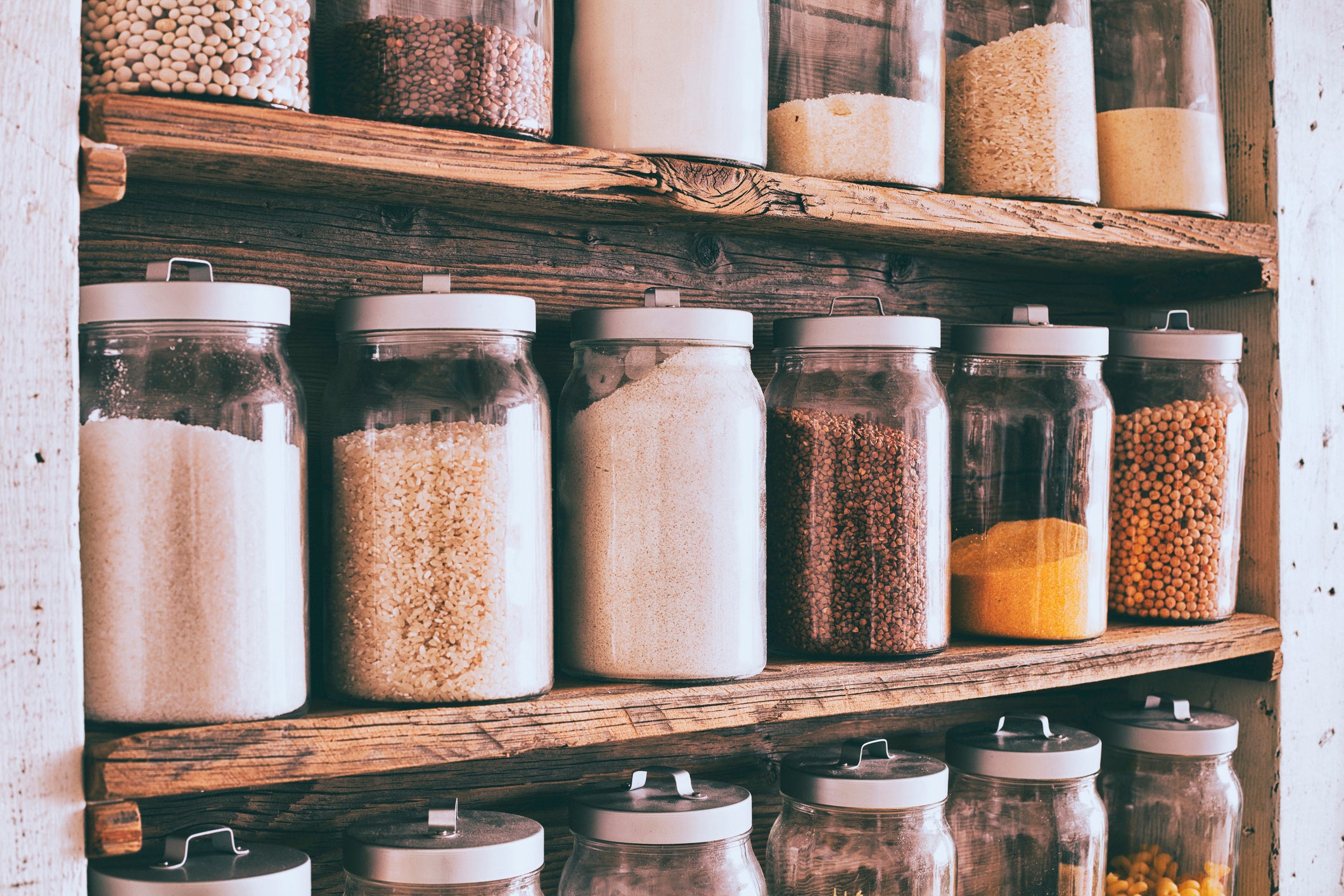The Trail Runner's Pantry

Jars of ingredients on wooden shelves
Short on time, but still trying to fuel your body well? Even the busiest runners can ensure that they have some nutrition essentials on hand for when time is limited. As a sports dietitian, I always suggest keeping the following items stocked in your pantry–and for good reason, nutrition can make or break your recovery and performance. Here’s how to stock your pantry so that you’re always ready in a pinch.
#1) Shelf Stable Protein Sources: Protein needs of endurance runners top in at about 1.6-2x the general population. This oftentimes means that it will take a little bit more work and intentionality to meet protein requirements to help with muscle repair and recovery. Having some shelf stable protein options on hand like canned beans, tofu, jerky, shelf-stable milk, and a good protein powder can make it easy to up your protein game at a moment’s notice.
RELATED: Signs You Might Want To Up Your Protein
#2) Electrolytes: Whether you are running in the heat or cold, having a good electrolyte supplement on hand can help replenish what you’ve lost through sweat. Keep in mind that sodium is the electrolyte lost in the highest amounts, while others like Chloride, Potassium, Magnesium, and Calcium are also lost. Replenishing these electrolytes helps maintain their key role in maintaining fluid balance in the body, muscle function, and energy metabolism. While food itself does contain electrolytes, electrolyte tabs or hydration mixes can help ensure quicker, larger amounts are being taken in at once. Nuun tablets, Trace Mineral Drops, Liquid IV or even a little bit of hydration mix like Skratch or Tailwind can help replace and replenish.
RELATED: Ask The RDN: Food For Recovery
#3) Gels, Chews, Sports Nutrition Products: Going out on a trail adventure with no fuel sources is like running a car without gas. Gels, chews, and other sports nutrition products like waffles, can make it easier to fuel well with carbohydrates. Keep in mind when choosing your sports nutrition products that you are an individual, and need to test out what works for you and your body to avoid GI distress and fuel up properly.
RELATED: How Can Vegans Get Enough Iron?
Pro Tip: When choosing sports nutrition products, pay attention to the calorie count in the product, as well as the electrolytes and sugar type(s). Some good guidelines to get you started are: Aim to take in 200-300 calories per hour, a mixture of carbohydrate types like glucose and fructose (this ensures avoiding the dreaded bonk and GI distress), and 250-500 mg of sodium per hour.
RELATED: How Much Electrolyte Do You Really Need?
#4) Cast Iron Skillet: Not a food-related nutrition product, but this kitchen essential is one that should be included in every trail runner’s pantry due to its ability up the iron content of food that is cooked in it. Iron is a nutrient of concern for runners due to the fact that it is lost in higher amounts in urine, feces, and sweat and that there is increased red blood cell breakdown due to foot strike hemolysis (damaging of red blood cells and release of iron). Being low in iron can significantly affect exercise capacity and performance. While iron can be found in foods like nuts, seeds, beans, and meat sources, it can be hard to get enough in. Using a cast-iron skillet to cook, can increase the iron content in foods by a few mg, which can make a big difference in overall intake!
#5) Nuts, seeds, nut butters: When it comes to energy needs for trail runners, let’s just say it can be hard to get it all in. Not to mention, long runs can zap that appetite due to a temporary reduction in the appetite-stimulating hormone, leptin. Nuts, seeds and nut butters can be a cost-efficient way to pack a large bang for your buck. Add some nut butter to a smoothie or throw some seeds on your salad or as a snack pairing to up your nutrition game. As a bonus, many nuts and seeds contain key micronutrients like iron, zinc, and selenium, which can help with energy production and balancing out oxidative stress.